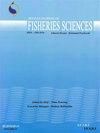Research Article: Study on formulated diet for large yellow croaker (Larimichthys crocea) larvae at the early feeding stage
IF 0.6
4区 农林科学
Q3 FISHERIES
引用次数: 2
Abstract
Most hatcheries in China rely on live prey for successful rearing of fish and shrimp larvae. Besides the high costs, live prey with pathogenic bacteria also increases the risk of contracting foodborne diseases. More than 3.5 billion large yellow croaker (Larimichthys crocea) larvae (total length over 4-centimeters) were raised in 2016. However, no formulated diet is available for replacing live feed in early stages of this croaker so far. In the present study, a new microdiet (Yq) is investigated for rearing croaker larvae at early stages (15 days after hatching). A commercial import diet (Cd) and live prey (Lp) were fed as controls. About 20,000 larvae per tank were hatched from Ningde Fufa Fishery Company in May 4th, 2017. Quality parameters, such as growth performance, survival and three digestive enzyme activities were measured. The survival rate of Yq (58.5%), Cd (51.5%) and Lp (69.6%) exhibited no significant difference (p >0.05). Furthermore, the cost of Yq was only about 23.3% of the cost of Lp. Specific growth rate in Lp was about 8 times higher (p 0.05). The high survival rate and low cost of Yq showed that it is suitable in rearing Larimichthys crocea larvae at the early stages.研究文章:大黄鱼幼虫早期饵料配方研究
中国的大多数孵化场都依靠活猎物来成功饲养鱼虾幼虫。除了高昂的成本外,携带致病菌的活猎物也增加了感染食源性疾病的风险。2016年,养殖了超过35亿条大黄鱼幼虫(总长超过4厘米)。然而,到目前为止,还没有配方饲料可用于替代这种黄花鱼早期阶段的活饲料。在本研究中,研究了一种新的用于饲养早期(孵化后15天)黄花鱼幼虫的微饲料(Yq)。以商业进口日粮(Cd)和活猎物(Lp)为对照。2017年5月4日,宁德福发渔业公司孵化出每箱约20000只幼虫。测定了生长性能、存活率和三种消化酶活性等品质参数。Yq(58.5%)、Cd(51.5%)和Lp(69.6%)的存活率无显著差异(p>0.05)。此外,Yq的成本仅为Lp成本的23.3%。Lp的比生长率高出约8倍(p<0.05)。Yq的高存活率和低成本表明,它适合于早期饲养大菱鲆幼虫。
本文章由计算机程序翻译,如有差异,请以英文原文为准。
求助全文
约1分钟内获得全文
求助全文
来源期刊

Iranian Journal of Fisheries Sciences
FISHERIES-
CiteScore
2.30
自引率
11.10%
发文量
0
审稿时长
3 months
期刊介绍:
1- Living various species (contains animals and vegetal species) in various aquatic ecosystems.
2- Health and diseases of aquatic species.
3- Determining the stocks and specific time and location for catching and reliable exploitation for sustainable development.
4- Methods of propagation and culture of high value aquatic resources.
5- Aquatic stock assessment and the methods of restocking the high value species and suggestion for rate, areas and the time for releasing fish and other aquatic organisms fries.
6- Pollutant agents and their effects to the environments of aquatic species.
7- Feed and feeding in aquatic organisms.
8- Fish processing and producing new products.
9- The economic and social aspects of fisheries.
 求助内容:
求助内容: 应助结果提醒方式:
应助结果提醒方式:


